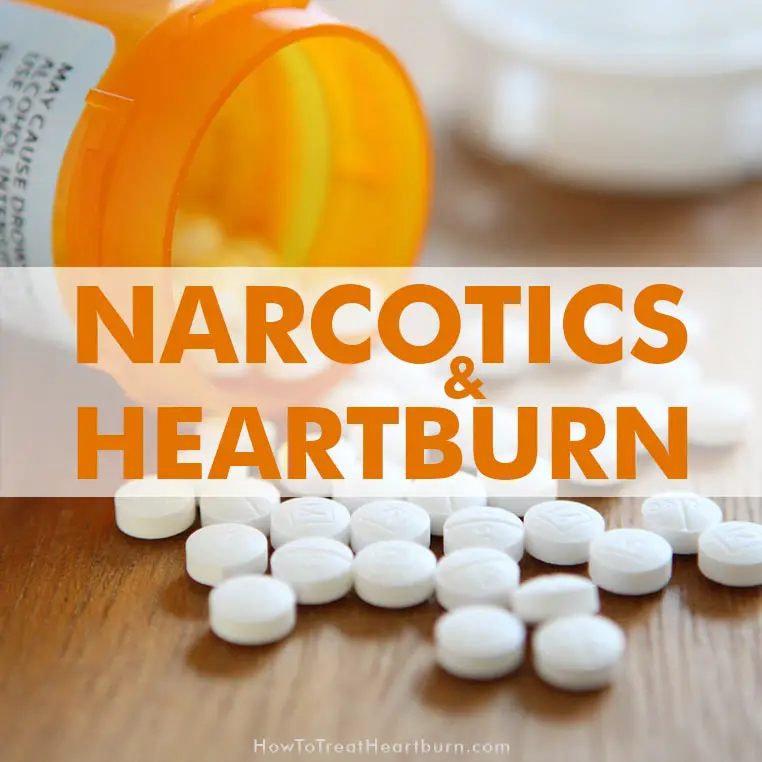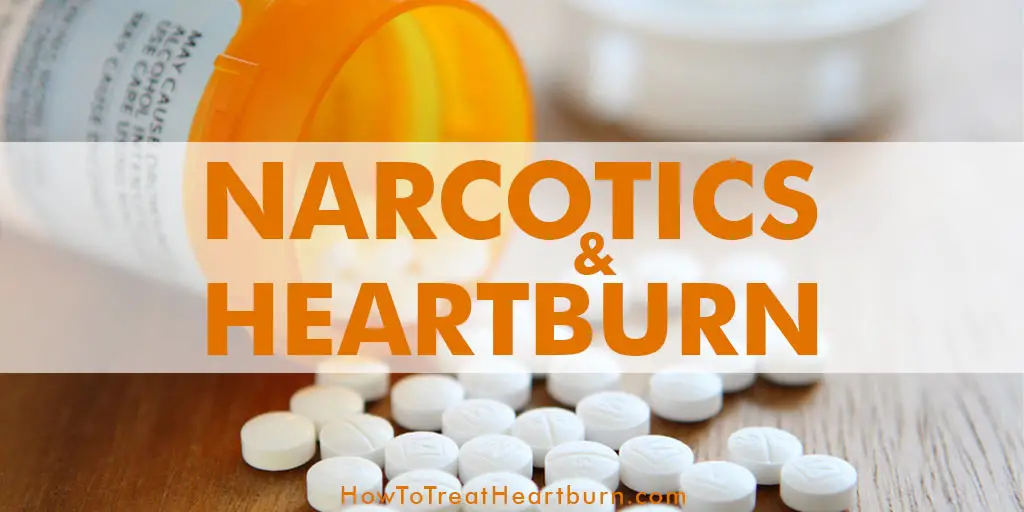Disclosure: I am compensated for purchases made through some links on this site. Click for details.
Narcotics like morphine, codeine, oxycontin, and methadone cause heartburn and worsen acid reflux, and gastroesophageal reflux disease (GERD) symptoms by causing esophageal dysfunction, slowed digestion, and opioid-induced vomiting.
Ways Narcotics Cause Heartburn
Narcotics are an opioid pain medication that affects the functions of the enteric nervous system (ENS), the part of the autonomic nervous system (ANS) that controls the gastrointestinal tract, causing dysmotility, decreased fluid secretion, and sphincter dysfunction.
The impairment of narcotics on the gastrointestinal tract encompasses the entire tract from the esophagus to the colon leading to opioid-induced bowel dysfunction (OIBD or OBD).1,2,3
Patients with OIBD exhibit signs of opioid-induced constipation (OIC), opioid-induced nausea and vomiting (OINV), and/or narcotic bowel syndrome (NBS).4
1) Esophageal Dysfunction
Esophageal dysfunction due to narcotic use can make swallowing difficult and increase heartburn, acid reflux and GERD symptoms.
Narcotics decrease the involuntary constriction and relaxation of the muscles in the esophagus that form wavelike movements to transport food and liquid to the stomach. Narcotics also weaken and impair the function of the lower esophageal sphincter (LES) allowing acid to reflux into the esophagus.
The LES is a band of muscle between the esophagus and the stomach. It opens to let food into the stomach and when working properly closes to keep food from refluxing back into the esophagus. The pain caused by acid irritating the esophagus is the pain we know as heartburn.
2) Dysmotility and Constipation
Gastrointestinal dysmotility is when the intestines lack the ability to coordinate muscular contractions to move food through the digestive tract. This includes the migrating motor complexes (MMC) that occur and between meals to clean out any remaining food and bacteria.
Delayed gastric emptying increases pressure in the stomach and on the LES and prompts the stomach to increase stomach acid production. The increased pressure on the LES can cause the closure to weaken allowing stomach acid to reflux into the esophagus.
Constipation also occurs when the digestive process slows. The extra volume in the intestines creates abdominal pressure that puts pressure on the stomach and the LES above it. Again, the added pressure on the LES can lead to acid reflux and heartburn.
3) Opioid-Induced Vomiting
Opioid-induced nausea and vomiting (OINV) is a side effect of narcotics. Regurgitated stomach acid can irritate the esophagus causing heartburn.
Preventing Narcotics Heartburn
What can be done if your narcotics are causing heartburn? The side effects of narcotic use are a major challenge. If you notice a worsening of heartburn, acid reflux, or GERD symptoms speak with your physician about your symptoms. There may be other treatment options available for relieving your pain.
Your physician may recommend one or more of the following strategies for preventing heartburn caused by narcotics.
- Limiting the dosage of narcotic may help relieve symptoms but lower dosages may be found insufficient for treating pain.1
- Pain medication other than narcotics may be an option though NSAIDs can also cause heartburn.
- Adjust other medications that may be contributing to heartburn. Adjusting the time when medications are taken, can reduce the risk of heartburn.
- Heartburn medication may be prescribed to treat heartburn symptoms.
- Opioid antagonists may be co-administered to block the negative effects of narcotics in the gastrointestinal tract.1
- The use of a gastroprokinetic agent may improve gastrointestinal motility by increasing the involuntary constriction and relaxation of the muscles in the gastrointestinal tract.
- Laxatives are often prescribed to relieve constipation. Natural laxatives may also help.
- Probiotics can improve functions of the digestive tract promoting gastrointestinal motility and elevating constipation.
- Drink more water.
- Eat more fiber and/or take a fiber supplement.
- Limit foods that may cause constipation.
- Avoid heartburn trigger foods.
- Exercise more often. Exercise stimulates movement in your gastrointestinal tract. Check out these heartburn-friendly exercises.
- Stop smoking and/or vaping. Tobacco use relaxes the LES and irritates the esophagus.
- Limit alcohol intake. Alcohol relaxes the LES and causes dehydration which further exacerbates constipation issues.
Be sure to consult your physician before making any changes to your medications.
Narcotics Heartburn and GERD Conclusion
Use of narcotics can cause esophageal dysfunction, slowed digestion, and opioid-induced vomiting increasing the risk of heartburn from acid reflux and increasing the risk of developing GERD or causing GERD symptoms to worsen.
Fortunately, gastric functions improve when narcotic use is discontinued.

References
1) Brock C, Olesen SS, Olesen AE, Frøkjaer JB, Andresen T, & Drewes AM. “Opioid-induced bowel dysfunction: pathophysiology and management.” National Center for Biotechnology Information, U.S. National Library of Medicine, October 1, 2012.
2) Brian E. Lacy, MD, PhD. “Effects of Opioids on Esophageal Dysfunction.” Gastroenterology & Hepatology, May 5, 2016.
3) Müller-Lissner S, Bassotti G, Coffin B, Drewes AM, Breivik H, Eisenberg E, Emmanuel A, Laroche F, Meissner W, & Morlion B. “Opioid-Induced Constipation and Bowel Dysfunction: A Clinical Guideline.” National Center for Biotechnology Information, U.S. National Library of Medicine, Pain Medicine Journal, October 1, 2017.
4) Lee AA, & Hasler WL. “Opioids and GI Motility-Friend or Foe?.” National Center for Biotechnology Information, U.S. National Library of Medicine, Current Treatment Options in Gastroenterology, December 2016.


